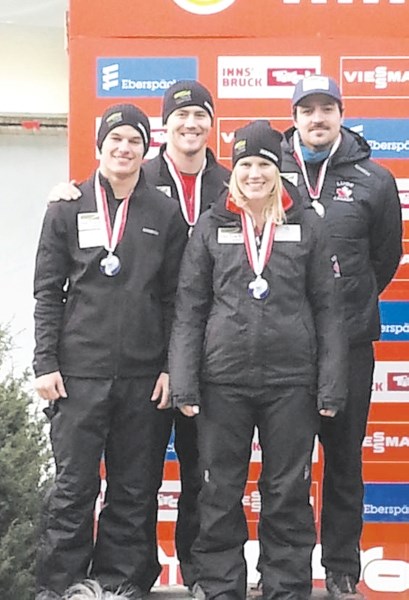Cochrane’s Tristan Walker, along with sliding partner Justin Snith of Calgary, has opened the World Cup luge season with a silver medal in the team relay event.
Walker and Snith joined Canadian teammates Alex Gough and Sam Edney on the podium at Igls, Austria, Nov. 25.
Considering he spent all summer rehabilitating serious tendon damage in his right hand, Walker is off to a successful start in the team relay event, which will be a medal competition in the Winter Olympic Games for the first time in 2014 at Sochi, Russia. In team relay, a women’s singles sled, a men’s singles sled and a doubles sled take one run each, with the combined time of all sleds counting towards the final team time.
The Canadian luge team spent the first half of November training on the Olympic luge track in Sochi.
“Sochi was a lot of fun. The track is interesting,” Walker said in a telephone interview with The Eagle from Igls. “It’s actually built with three uphill sections in it to slow the sleds down a bit. It’s going to be difficult to try to keep the speed through the uphill sections.”
With terminal velocities reaching upwards of 135 km/h, a little speed check here and there can’t hurt.
“It’s definitely unique, for sure. There’s one curve where you enter on a pretty steep uphill and leave on a fairly steep downhill. It’s definitely a new feeling. It’s not anywhere else in the world you do that.”
And the 30 trips Walker and Snith took down the Sochi track earlier this month are key to their success at the Olympic luge event there 14 months from now.
“The number of runs on any track will definitely reflect in your result at any race,” Walker observed. “We were sliding pretty well in our first 30 runs there. From now on, we’re just trying to find the finer aspects of going fast rather than learning the track and figuring out how to get to the bottom.”
Canadian luge coach Wolfgang Staudinger offered a brief assessment of Walker and Snith’s early-season form. As a high-performance coach who demands the very best from his athletes, he can be hard to please.
“There’s a long way to go,” he stated. “We are, by far, not where we need to be.”
But considering the severity of Walker’s summer hand injury, which required surgery and 12 weeks of recovery, the Cochrane luger was pleasantly surprised on his first launch of the season. Your hands are key in the sport, being relied upon to pull the sled hard from a standing start and then “paddling” the ice prior to flying down the track.
“I got cleared by the surgeon the day I left for Europe Nov. 2 and I was quite pleasantly surprised the first time I worked on pulling a start and paddling in Russia,” Walker said. “It was surprising how strong it felt already. It just keeps getting better and better every day. I’m already up to doing everything I used to be able to do in the gym when we’re working out. It’s feeling really strong.”
Along with silver in the team relay, Walker and Snith finish seventh Nov. 24 in the two-man event at Igls with a two-run time of one minute, 19.894 seconds.




